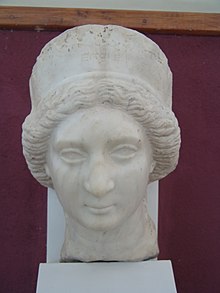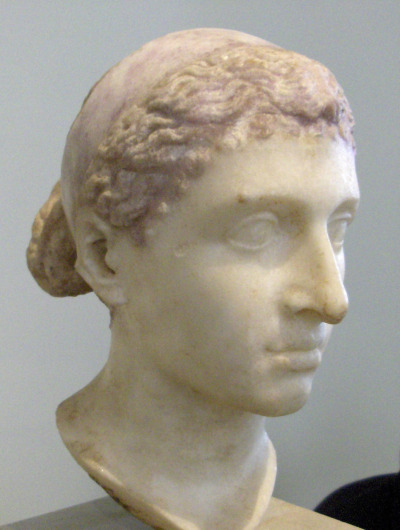In May 44 Cicero wrote to a friend indicating that Cleopatra (then in Rome) was pregnant with Caesar's child:
There is also a coin of Cleopatra's which shows her suckling a child, usually interpreted to be Caesarion, and marked 'Kupr' (Cyprus). It seems to be that Cleopatra only acquired control of Cyprus c.43BC, at which time Caesarion (born in 47BC) would be too old to be a suckling infant.
Fast forward a few years and Augustus arranges the marriage of Cleopatra Selene (daughter of Mark Anthony and Cleopatra) with King Juba of Mauretania. At around the same time he gives an Italian slave girl called Thermusa (Thea Musa) or Thea Urania to King Phraates IV of Parthia, a far more important ruler than Juba.
Thea Musa/Urania became Phraates IV's chief queen, eventually murdering him and replacing him with their son Phraataces. She married her son and ruled with him for about six years (2BC-4AD), until they got deposed. Parthian texts list Phraates' wives as Olieniere, Bistheibanaps, Baseirta and Cleopatra.
A generation later King Ptolemy of Mauretania (born in 1AD) married a princess called Julia Urania. He was raised in Rome and was there until 22AD, after which he returned to Africa. We can therefore assume Julia Urania was in Rome. Their daughter Drusilla was born c.38AD.
A few points to consider:

Bust of Thea Musa Urania

Bust of Queen Cleopatra - look at that nose
I am grieved to hear of Tertia's loss of an expected child...(but) I should be glad of such a loss in the case of the queen (Cleopatra) and that [expected] scion of the breed of Caesar.
There is also a coin of Cleopatra's which shows her suckling a child, usually interpreted to be Caesarion, and marked 'Kupr' (Cyprus). It seems to be that Cleopatra only acquired control of Cyprus c.43BC, at which time Caesarion (born in 47BC) would be too old to be a suckling infant.
Fast forward a few years and Augustus arranges the marriage of Cleopatra Selene (daughter of Mark Anthony and Cleopatra) with King Juba of Mauretania. At around the same time he gives an Italian slave girl called Thermusa (Thea Musa) or Thea Urania to King Phraates IV of Parthia, a far more important ruler than Juba.
Thea Musa/Urania became Phraates IV's chief queen, eventually murdering him and replacing him with their son Phraataces. She married her son and ruled with him for about six years (2BC-4AD), until they got deposed. Parthian texts list Phraates' wives as Olieniere, Bistheibanaps, Baseirta and Cleopatra.
A generation later King Ptolemy of Mauretania (born in 1AD) married a princess called Julia Urania. He was raised in Rome and was there until 22AD, after which he returned to Africa. We can therefore assume Julia Urania was in Rome. Their daughter Drusilla was born c.38AD.
A few points to consider:
1. If Cleopatra had a daughter with Julius Caesar, why was she ignored during the Donations of Alexandria?
2. If Thea Musa Urania was an Italian slave girl, why did Augustus consider her the best gift possible to King Phraates? What are the chances of a whore/slave being considered a worthy consort of the Parthian King of Kings? And would Phraates have put aside his royal wives - traditionally his own sisters - to marry a foreign slave?
3. If Thea Musa Urania was an Italian slave girl, why does she have the names of Greek royalty? The Ptolemaic queens were devoted to Aphrodite Urania ("Heavenly Urania"), who was also the ancestral goddess of Julius Caesar (as Venus Genetrix). Cleopatra identified herself both as Isis (Queen of Heaven) and Aphrodite; in the Dendera temple reliefs she appears as Isis-Aphrodite holding her son Horus-Eros (Caesarion). If we identify her with the otherwise random wife of Phraates called Cleopatra, Cleopatra Thea Musa/Urania (Cleopatra the Heavenly Goddess?) makes for a perfect fit for a Ptolemaic royal name - see her mother's name of Cleopatra Tryphaena Thea Neotera (Tryphaena the Younger Godess), and siblings Alexander Helios (Alexander "Sun") and Cleopatra Selene (Cleopatra "Moon").
4. If Thea Musa Urania was an Italian slave girl, would she have had the audacity to murder her royal husband and marry her own son? Perhaps years in power made her bold, but such incest was completely abhorrent to Romans of any class. Likewise female rule was completely unknown in Italy. On the other hand, such incest was completely acceptable - even preferred - by the Ptolemaic line, as was the sharing of power between incestous royal couples. Cleopatra and Caesarion were associated on the throne as ceremonial consorts, she as the senior ruler he as the junior. If Thea Musa Urania was Cleopatra's daughter, her descent from Alexander The Great/the Seleucids would have more than validated her as a worthy consort for King Phraates and later on as Queen of Asia in her own right.
5. If Julia Urania was a daughter of Thea Musa Urania, she is the obvious bride for King Ptolemy. The last remaining scions of the "pure" Ptolemaic line desperately wanting to perpetuate their divine lineage. The Roman name Julia relates to women of the gens Julia, perhaps a reference to her grandfather Julius Caesar? (Around this time naming rules for women became more lax and names from mothers and grandmothers started to be added to names taken from father). If she was a princess from Emessa as has sometimes been conjectured, 'Heavenly Julia' would not a) have any reason to be in Rome b) have any reason to be preferred bride for Ptolemy. Surely his mother would have encouraged him to marry to one of the eastern royal houses who did have Ptolemaic blood, albeit a bit more distantly?
Any thoughts, ideas, speculation welcome.2. If Thea Musa Urania was an Italian slave girl, why did Augustus consider her the best gift possible to King Phraates? What are the chances of a whore/slave being considered a worthy consort of the Parthian King of Kings? And would Phraates have put aside his royal wives - traditionally his own sisters - to marry a foreign slave?
3. If Thea Musa Urania was an Italian slave girl, why does she have the names of Greek royalty? The Ptolemaic queens were devoted to Aphrodite Urania ("Heavenly Urania"), who was also the ancestral goddess of Julius Caesar (as Venus Genetrix). Cleopatra identified herself both as Isis (Queen of Heaven) and Aphrodite; in the Dendera temple reliefs she appears as Isis-Aphrodite holding her son Horus-Eros (Caesarion). If we identify her with the otherwise random wife of Phraates called Cleopatra, Cleopatra Thea Musa/Urania (Cleopatra the Heavenly Goddess?) makes for a perfect fit for a Ptolemaic royal name - see her mother's name of Cleopatra Tryphaena Thea Neotera (Tryphaena the Younger Godess), and siblings Alexander Helios (Alexander "Sun") and Cleopatra Selene (Cleopatra "Moon").
4. If Thea Musa Urania was an Italian slave girl, would she have had the audacity to murder her royal husband and marry her own son? Perhaps years in power made her bold, but such incest was completely abhorrent to Romans of any class. Likewise female rule was completely unknown in Italy. On the other hand, such incest was completely acceptable - even preferred - by the Ptolemaic line, as was the sharing of power between incestous royal couples. Cleopatra and Caesarion were associated on the throne as ceremonial consorts, she as the senior ruler he as the junior. If Thea Musa Urania was Cleopatra's daughter, her descent from Alexander The Great/the Seleucids would have more than validated her as a worthy consort for King Phraates and later on as Queen of Asia in her own right.
5. If Julia Urania was a daughter of Thea Musa Urania, she is the obvious bride for King Ptolemy. The last remaining scions of the "pure" Ptolemaic line desperately wanting to perpetuate their divine lineage. The Roman name Julia relates to women of the gens Julia, perhaps a reference to her grandfather Julius Caesar? (Around this time naming rules for women became more lax and names from mothers and grandmothers started to be added to names taken from father). If she was a princess from Emessa as has sometimes been conjectured, 'Heavenly Julia' would not a) have any reason to be in Rome b) have any reason to be preferred bride for Ptolemy. Surely his mother would have encouraged him to marry to one of the eastern royal houses who did have Ptolemaic blood, albeit a bit more distantly?

Bust of Thea Musa Urania

Bust of Queen Cleopatra - look at that nose
Last edited: